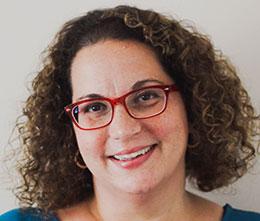
Joanna
Newton
School of Education
Education
- Ph.D. in Education: Literacy, George Mason University, 2018
- Literacy Specialist Endorsement, George Mason University, 2010
- M. Ed. In Curriculum and Instruction, George Mason University, 2004
- B.A. in Sociology, The George Washington University, 1997
Bio
Joanna Newton, PhD, is an Assistant Professor in the School of Education at Notre Dame of Maryland University where she teaches undergraduate and graduate classes in literacy instruction. Joanna has 19 years of experience supporting literacy teaching and learning in the public schools. She has served as an elementary classroom teacher, school-based reading coach and reading intervention specialist. She has also worked as a district-level literacy coach, professional development facilitator, and curriculum developer for K-6 literacy instruction. Joanna began her career as a teacher of English when she served as a Peace Corps Volunteer in Armenia. Her research interests include academic vocabulary instruction and the impact of morphology instruction on student's literacy learning as well as professional development models that teachers identify as supportive of their efforts to make and sustain improvements to instructional practice.
Recent Publications and Presentations
Newton, J. (2024, November). ‘Just not on the Radar:’ Factors That Influence Teachers’ Decisions About Vocabulary Instruction. Association of Literacy Educators and Researchers Annual Conference, Orlando, FL.
Newton, J. (2024, March). Less hand raising; more turn and talk: The impact of an SUP professional development cohort on instructional beliefs and practices around supporting English learners in a K-5 elementary school. National Association of School University Partnerships Annual Conference, Anaheim, CA.
Savick, S. Newton, J., Silver, P. & Watson, L. (2024, March). Supporting Pk-12 continuous school improvement efforts in a school-university partnership network. National Association of School University Partnerships Annual Conference, Anaheim, CA.
Newton, J. & Bennink, K. (2023). ‘Learning it together: Administrators as partners and coaches. Reading in Virginia, XLV, 25-30.
Newton, J. (2023). The Ginsburg Elementary Bookmobile. In Vaughn, M. & Parsons, S.A. Accelerating Learning Recovery for All Students: Core Principles for Getting Literacy Growth Back on Track (pp. 35-27). The Guilford Press.
Newton, J. (2023, March). NAPDS essentials in action: Revitalizing a School University Partnership. National Association of Professional Development Schools Annual Conference, Jacksonville, FL.
Rasinski, T., Padak, N., Newton, R.M., Newton, E., & Newton, J. (Contributing Author). (2020). Building Vocabulary with Greek and Latin Roots: A Professional Guide to Word Knowledge and Vocabulary Development (2nd edition). Huntington Beach, CA: Shell Education.
Newton, J. (2019). Elizabeth (Betty) Guiles Sturtevant: A life. A Ten Years Retrospective of the Association of Literacy Educators and Researchers: 2008-2018, 267-280.
Newton, J. (2018). Teachers as learners: The impact of teachers’ morphological awareness on vocabulary instruction. Education Sciences Special Issue: Vocabulary Development, 8(161), 2-9.
Rasinski, T., Padak, N., & Newton, J. (2017). The roots of comprehension: Studying Latin and Greek word origins makes vocabulary instruction resonate. Educational Leadership, 74(5), 41-45.
Newton, J. (2016, December). Teachers as learners: The transformative power of professional development on teachers’ beliefs about vocabulary instruction. Presentation at the Literacy Research Association Sixty-Sixth Annual Conference, Nashville, TN.
Rasinski, T. & Newton, J. (2015, July). Teaching vocabulary from word roots: Powerful instruction for increasing word knowledge for reading. Presentation at the International Literacy Association Sixtieth Annual Conference, St. Louis, MO.
Newton, J. & Monroy, A. (2014). Bringing theory to practice: Lessons learned from an after-school intervention program. Making Literacy Connections, 24, 59-79.
Newton, J. (2013, April). Classroom-tested strategies for nurturing the affective domain in young readers: Building the affective-domain in struggling sixth grade readers using readers’ theater. Presentation at the International Reading Association, Fifty-Eighth Annual Convention, San Antonio, TX.
Rasinski, T., Padak, N., Newton, E., Newton, R. & Newton, J. (2012, May). Teaching vocabulary from word roots: An instructional routine for elementary grades. Presentation at the International Reading Association Fifty-Seventh Annual Convention, Chicago, IL.
Rasinski, T., Padak, N., Newton J., & Newton, E. (2011). The Latin-Greek connection: Building elementary students’ vocabulary through morphological study. The Reading Teacher, 65(2) 133-141.
Rasinski, T., Padak, N., Newton, E., Newton, R. & Newton, J. (2010, April). Divide, conquer, combine, and create: A vocabulary learning routine for grades 1-11. Presentation at the International Reading Association Fifty-Fifth Annual Convention, Chicago, IL.
Newton, J. (2005, May). Using literature to examine social issues in a multicultural second grade. Presentation at the International Reading Association Fiftieth Annual Convention, San Antonio, TX.
Newton, J. (2004, May.) A Peace Corps volunteer uses Language Experience Approach in an Armenian village school. Presentation at the International Reading Association, Forty-ninth Annual Convention, Reno, NV.
Professional Associations
- Association of Literacy Educators and Researchers
- Association for Supervision and Curriculum Development
- International Literacy Association
- Literacy Research Association
- Virginia State Literacy Association: Greater Washington Chapter
Professional Awards and Recognition
- Outstanding Leader School Recipient Award, Fairfax County Public Schools, 2019
- College of Education and Human Development Outstanding Dissertation Award Nominee, George Mason University 2018.
- Outstanding Achievement in Multicultural Education Award from the College of Education and Human Development, George Mason University 2004.
- Featured in Heitin, L. (2016, April 12). Education Week. Can Latin help younger students build vocabulary?
- Facilitation of vocabulary-focused professional development study group featured.
- Featured in Fawcett, G. (2013). Vocabulary in Action: Lessons from Great Literacy Teachers. Lanham, MD: Rowman and Littlefield.
- Classroom instruction focus of Chapter 3: You don’t have to be Greek to teach Greek and Latin roots: Morphology instruction in Fairfax County, Virginia.
- Featured in Padak, N., Newton E., Rasinski, T. & Newton, R. (2008). Getting to the Root of Word Study: Word Roots in Elementary and Middle Grades.
- Classroom instruction featured in lead chapter in A.E. Farstrup & S.J. Samuels (Eds.). What Research Has to Say About Vocabulary Instruction (pp. 6-31). Newark, DE: International Reading Association.

